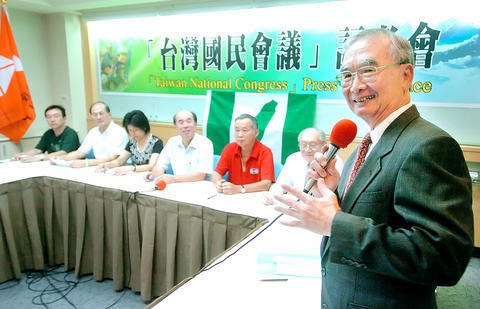A new pro-independence coalition yesterday vowed to push referendums on changing the name of the country and repeal the Referendum Law (公投法) next year in conjunction with the presidential election.
The Taiwan National Congress (TNC), formed by over 20 local and international pro-independence groups last Wednesday, said it hopes to push for a referendum on changing the country's official name from the Republic of China to Taiwan and another referendum on invalidating the Referendum Law, because "the high thresholds deprive Taiwanese of the ability to exercise their democratic rights."
The law stipulates that a successful petition for a referendum requires 0.5 percent of eligible voters who took part in the most recent presidential election to sign it -- about 80,000 people. In addition, signatures of 5 percent of the number of voters in the nation, or approximately 800,000 people, are needed before the petition can be screened by the Referendum Review Committee.

PHOTO: WANG MIN-WEI, TAIPEI TIMES
The law also prohibits people from initiating more than one referendum on the same topic within a three year period if the initial referendum fails to win support from the public.
TNC spokesman Ted Lau (劉重義) told a press conference yesterday that the congress would not follow the procedures stipulated in the Referendum Law to mount the two referendums and would declare its referendums successful if more than half of the voters agree.
It also plans to invite international experts to supervise the process and to ensure the referendums are conducted in a fair and transparent manner, Lau said.
Whether such referendums, carried out without reference to the legal mechanisms, would have any meaning if they were passed, Lau could not say but asked "is Taiwan a country governed by the rule of law?"
He said the group's intention was not to make Taiwan a lawless nation as the "Chinese Party [Chinese Nationalist Party [KMT]] have already done that."
Coalition secretary-general Hsu Fu-tong (
Through the referendums, Hsu said, Taiwan could tell the world exactly what the people want.
Lau said their short-term goal is to establish a mechanism whereby the public can have a direct say on major issues and veto legislation that it deems "inappropriate."
Their intermediate goal is to abolish the Legislative Yuan and the ultimate goal is to establish a "new and independent country," he said.

Alain Robert, known as the "French Spider-Man," praised Alex Honnold as exceptionally well-prepared after the US climber completed a free solo ascent of Taipei 101 yesterday. Robert said Honnold's ascent of the 508m-tall skyscraper in just more than one-and-a-half hours without using safety ropes or equipment was a remarkable achievement. "This is my life," he said in an interview conducted in French, adding that he liked the feeling of being "on the edge of danger." The 63-year-old Frenchman climbed Taipei 101 using ropes in December 2004, taking about four hours to reach the top. On a one-to-10 scale of difficulty, Robert said Taipei 101

A preclearance service to facilitate entry for people traveling to select airports in Japan would be available from Thursday next week to Feb. 25 at Taiwan Taoyuan International Airport, Taoyuan International Airport Corp (TIAC) said on Tuesday. The service was first made available to Taiwanese travelers throughout the winter vacation of 2024 and during the Lunar New Year holiday. In addition to flights to the Japanese cities of Hakodate, Asahikawa, Akita, Sendai, Niigata, Okayama, Takamatsu, Kumamoto and Kagoshima, the service would be available to travelers to Kobe and Oita. The service can be accessed by passengers of 15 flight routes operated by

Taiwanese and US defense groups are collaborating to introduce deployable, semi-autonomous manufacturing systems for drones and components in a boost to the nation’s supply chain resilience. Taiwan’s G-Tech Optroelectronics Corp subsidiary GTOC and the US’ Aerkomm Inc on Friday announced an agreement with fellow US-based Firestorm Lab to adopt the latter’s xCell, a technology featuring 3D printers fitted in 6.1m container units. The systems enable aerial platforms and parts to be produced in high volumes from dispersed nodes capable of rapid redeployment, to minimize the risk of enemy strikes and to meet field requirements, they said. Firestorm chief technology officer Ian Muceus said

MORE FALL: An investigation into one of Xi’s key cronies, part of a broader ‘anti-corruption’ drive, indicates that he might have a deep distrust in the military, an expert said China’s latest military purge underscores systemic risks in its shift from collective leadership to sole rule under Chinese President Xi Jinping (習近平), and could disrupt its chain of command and military capabilities, a national security official said yesterday. If decisionmaking within the Chinese Communist Party has become “irrational” under one-man rule, the Taiwan Strait and the regional situation must be approached with extreme caution, given unforeseen risks, they added. The anonymous official made the remarks as China’s Central Military Commission Vice Chairman Zhang Youxia (張又俠) and Joint Staff Department Chief of Staff Liu Zhenli (劉振立) were reportedly being investigated for suspected “serious